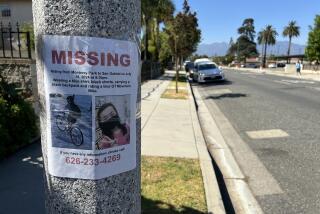Navarro Leads in S.D. Mayor’s Race
Managed-growth activist Peter Navarro, an underdog candidate with no elected experience, had built a solid lead in the San Diego mayor’s race Tuesday night. He was headed toward a probable November runoff against two-term County Supervisor Susan Golding.
Navarro led Golding in a contest that less than a year ago many doubted he would even enter. San Diego City Councilman Ron Roberts was running third, and financier Tom Carter was fourth.
“People are very tired of the incumbents,” Navarro said, as he has throughout the campaign. “They’re ready for a change, and I think there’s a very acute awareness in San Diego that we need to start planning for our future. They don’t want Los Angeles, and they see me as the guy who will prevent it.”
Golding, the front-runner in polls from beginning to end, proclaimed herself “satisfied” with an apparent second-place finish.
“I just want to be in the general (election),” she said. “Once you get in the general, you reshuffle the cards.”
Not since 1951, when voters propelled war hero John Butler into the mayor’s office, has a candidate without elected experience been chosen to lead the city. In Golding and Navarro, voters will choose between a career elected official and the founder of the city’s most prominent growth-management organization.
The primary race to succeed retiring Mayor Maureen O’Connor offered city voters a clear choice among two elected officials and two non-politicians, though all four sought to portray themselves as outsiders in a year when incumbency was seen as a liability. Loch David Crane, a magician, and William Thomas, an accountant, were also on the ballot as minor candidates.
Crime and local employment stood out as campaign issues, with the perennial debate over rapid growth and environmental protection pushed into the background by an economic recession that has thrown home construction into its worst slump since 1982, increased unemployment and sent office vacancy rates skyrocketing.
“For San Diegans, the overall issue really is the economy,” Mark Nelson, regional governmental affairs manager for San Diego Gas & Electric Co., said during the campaign.
The race soon evolved, however, into a personality contest and a clash of symbols. The starkest contrast may have been Navarro’s aggressive message of wholesale change, highlighted by his “don’t yield to developers” slogan and Roberts’ effort to convert his All-American family and personal business success story into political attributes.
In Golding, voters had the race’s one well-known quantity, a career officeholder who has spent more than a decade as a county supervisor, state official and San Diego city councilwoman.
In the early going, the 46-year-old Republican was herself a campaign issue. Her opponents not-so-subtly attempted to link Golding to her imprisoned ex-husband, former financier Richard Silberman, who was convicted in 1990 for his role in a scheme to launder what he believed was drug money.
In February, a memo from a Golding pollster surfaced with the suggestion that the supervisor propose cutting 2,000 able-bodied people from county welfare rolls for the publicity it would generate. And, in April, Golding’s tax returns showed that she paid no federal income tax in 1990 because of large home mortgage deductions left over from the days when Silberman was helping to pay the bills.
Roberts and Navarro attempted to capitalize when Golding stumbled, but she weathered the attacks. As the campaign wore on, Golding retained her front-runner status in virtually every poll conducted.
While voters’ familiarity with Golding was a major asset in a year when so many races clamored for their attention, Golding also profited from her position as the only woman in a race that included five men.
She frequently noted the City Council’s reputation for bickering and ineffectiveness, promising to bring experience and leadership to a city she said was badly in need of consensus building.
Navarro, the 42-year-old founder of Prevent Los Angelization Now!, appeared to rise most rapidly through the polls, coming from underdog status less than a year ago to challenge Golding for the race’s lead in the final days.
Often angry, always passionate, Navarro positioned himself as the race’s most powerful agent of change and built a core constituency of environmentalists and the disaffected out of his reputation as the city’s most prominent managed-growth activist.
He also spent his own money liberally, contributing more than $160,000 out of his personal bank account in an effort, he claimed, to balance the contributions that land developers were giving to his competitors. The candidates together spent more than $1 million in the primary alone.
Hamstrung by lower city-wide name recognition than Golding and Navarro, Roberts, a 49-year-old former architect, appealed to the city’s middle class with a campaign that emphasized his self-made status, his San Diego roots and his family.
But Roberts sometimes found himself in the awkward position of defending the council’s spotty record on crime and job creation, and his candidacy at times appeared not to reach beyond a comparatively small contingent of white, fairly conservative, Republicans.
Carter, a 51-year-old former savings and loan executive, never seemed to overcome his early notices as a sincere, hard-working, political unknown.
Campaigning as a self-styled “citizen politician” who would ring sanity back to the surreal world of City Hall, Carter kept a low profile until the race’s final weeks, when he made an all-out appeal based on the premise that he was the only Democrat among the four major candidates in the nonpartisan race.
More to Read
Sign up for Essential California
The most important California stories and recommendations in your inbox every morning.
You may occasionally receive promotional content from the Los Angeles Times.






